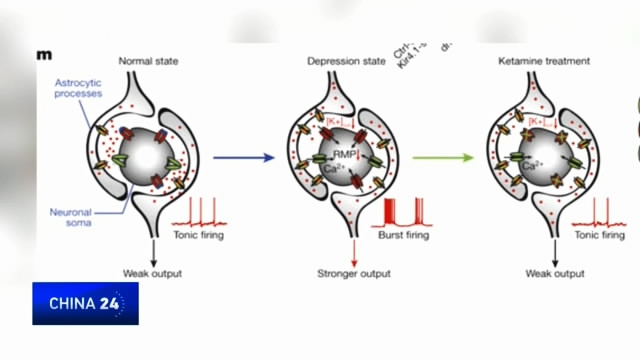
21:02, 18-Feb-2018
Fighting Against Depression: China's ketamine research shines light on treatment

There are some 300 million people worldwide suffering from depression. On Thursday, the international science journal Nature published two research articles by Chinese scientists. They dealt with breakthroughs that may help provide safer and more effective anti-depressants. CGTN's ZHENG CHUNYING has the story.
Within just thirty minutes the darkest thoughts in patients with depression vanish. And the effects can last for weeks.
Scientists from China's Zhejiang University have discovered how the drug, ketamine, works to block the neuronal activity that drives depression-like behavior.
The drug switches off an erratic burst of electrical impulses firing in neurons in the brain region, known as the lateral habenula.
When it's firing, it acts against these areas where key mood-boosting neurotransmitters, dopamine, and serotonin, are produced and collected in the brain. And understanding this may lead to the core mechanism of depression.
"We are just scratching the surface, in terms of understanding of depression, so any new insight of the molecular mechanism of depression, the action of anti-depression drugs, how they work is very important."
Ketamine is an anesthetic substance used as a narcotic, often abused as a recreational drug. Molecular targets were identified when it was injected directly into the habenula. The team calls the results serendipitous.
PROFESSOR HU HAILAN ZHEJIANG UNIVERSITY SCHOOL OF MEDICINE "It usually takes more than six weeks before an improvement in the patient's mood is seen. Now, after we understand how ketamine acts on a fundamental link of the brain chemistry of depression, it would be more helpful for us to develop more effective anti-depressants."
And while more research is needed, ketamine is giving hope of relieving depression when all other treatments have failed. ZHENG CHUNYING CGTN.

SITEMAP
Copyright © 2018 CGTN. Beijing ICP prepared NO.16065310-3
Copyright © 2018 CGTN. Beijing ICP prepared NO.16065310-3